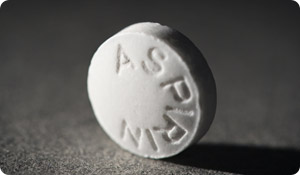
The humble and ubiquitous aspirin may play an important role in cancer prevention and treatment.
In a review of 10 studies of aspirin and prostate cancer, aspirin reduced the risk of prostate cancer in eight studies; while two showed an increased risk.
Scientists have accumulated significant evidence that aspirin plays a role in preventing colorectal cancer deaths. Aspirin suppresses new colon polyps in patients who previously had polyps. It also reduced the long-term incidence of, and mortality related to, colorectal cancer. These results were particularly pronounced for a hard-to-reach part of the colon called the proximal colon.
One recent study found that people who took aspirin had a 21 percent lower risk of dying from cancer after five years; after 20 years, there were 20 percent fewer deaths. The types of cancer that seem to benefit from aspirin included lung cancer (30 percent decrease in deaths), colorectal cancer (40 percent), and esophageal cancer (60 percent).
In a 2010 observational study, which cannot link cause and effect, aspirin use was also associated with a decreased risk for distant recurrence of breast cancer and breast cancer death. However, the researchers acknowledge that while this is another piece of important data, the results are still inconclusive.
At this point, cancer experts have not produced guidelines for using aspirin for chemoprevention. Despite promising study results, aspirin causes well-documented and potentially serious side effects, especially stomach bleeding and irritation. This risk is greater in those who have a history of gastrointestinal problems. Individuals should not take aspirin for cancer risk reduction without consulting with their physician.
In an online video to other physicians, oncologist Maurie Markman, MD recently discussed a study that examined the relative risk of low doses of aspirin in preventing complications from heart disease. While study participants who continued taking aspirin had recurrent bleeding from stomach ulcers, they also had lower overall mortality.
Dr. Markman reminded physicians that all medical interventions offer risks and benefits and urged them to discuss both with patients. While physicians may consider stomach bleeding too high a risk to recommend aspirin for cancer prevention, high-risk patients may find it acceptable.
Sources:
Surveillance Epidemiology and Research. "Nonsteroidal Anti-Inflammatory Drugs and Cancer Prevention." Web.
http://seer.cancer.gov/studies/epidemiology/study17.html
National Cancer Institute. "Low-Dose Aspirin Fails to Protect Women Against Cancer." Web. 27 July 2005.
http://www.cancer.gov/clinicaltrials/results/summary/2005/aspirin0705
Snowden, Rebecca V. "Daily Aspirin Use May Lower Cancer Death Risk, Study Finds." American Cancer Society. Web. 7 December 2010.
http://www.cancer.org/Cancer/news/News/daily-aspirin-use-lowers-cancer-death-risk-study-finds
National Cancer Institute. "Aspirin and cancer prevention." Web. 7 December 2005.
http://www.cancer.gov/cancertopics/prevention/aspirin-cancer-prevention
Salinas, Claudia A., Kwon, Erika M., FitzGerald, Liesel M., Feng, Ziding, Nelson, Peter S., Ostrander, Elaine A., Peters, Ulrike, and Stanford, Janet L.. "Use of Aspirin and Other Nonsteroidal Anti-inflammatory Medications in Relation to Prostate Cancer Risk." American Journal of Epidemiology 172(5) (2010): 578-590. Medscape Medical News. Web. 21 September 2010.
http://www.medscape.com/viewarticle/727905
Nelson, Roxanne. "Aspirin May Boost Survival in Breast Cancer." Medscape Medical News. Web. 17 February 2010.
http://www.medscape.com/viewarticle/717123
Mulcay, Nick. "20-Year Study: Aspirin Reduces Colon Cancer Incidence and Mortality." Medscape Medical News. 26 October 2010.
http://www.medscape.com/viewarticle/731232
Russell, Peter. "Aspirin Cuts Death Rate From Several Common Cancers." Medscape Medical News. Web. 7 December 2010.
http://www.medscape.com/viewarticle/733738
Markman, Maurie MD. "Low-Dose Aspirin: When Does the Benefit Outweigh the Risks?" Medscape Medical News. Web. 28 January 2010.
http://www.medscape.com/viewarticle/715967





